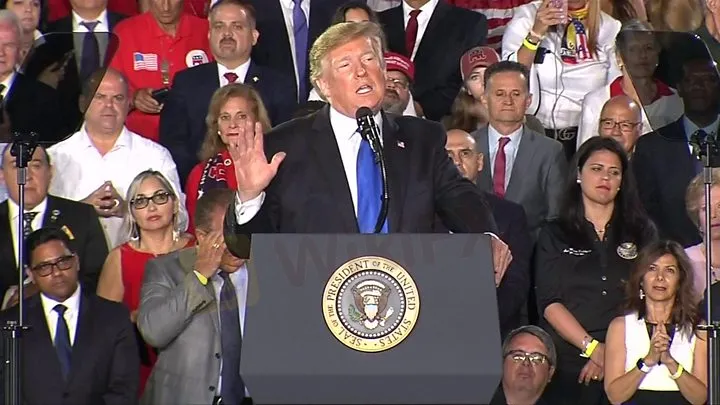简体中文
繁體中文
English
Pусский
日本語
ภาษาไทย
Tiếng Việt
Bahasa Indonesia
Español
हिन्दी
Filippiiniläinen
Français
Deutsch
Português
Türkçe
한국어
العربية
Venezuela crisis: Brazil vows to deliver aid, defying Maduro
Abstract:Image copyrightReutersImage caption Aid shipments on the Colombian border have so far been blocked
Image copyrightReutersImage captio
Aid shipments on the Colombian border have so far been blocked by Venezuela
Brazil says it will send humanitarian aid to its border with Venezuela by the weekend, despite the protests of embattled President Nicolás Maduro.
The delivery and distribution of the aid is being organised by Venezuelan opposition leader Juan Guaidó, the Brazilian presidential spokesman said.
Mr Maduro denies there is a crisis in Venezuela and calls the growing aid operation a US-orchestrated show.
Venezuela also closed its border with the Dutch island of Curacao.
The Caribbean island, off Venezuela's north coast, is planning to host US aid. Senior Venezuelan military commander Vladimir Quintero confirmed the closure of the air and sea border on Tuesday, but gave no further details.
The military has so far managed to block shipments of US aid from coming across the border with Colombia.
Venezuela crisis in nine chart
Why the military back Maduro
The men prepared to die for Maduro
Meanwhile, Venezuela's military has reaffirmed its support for President Maduro, rejecting a call by US President Donald Trump to switch allegiance to Mr Guaidó.
Image copyrightReutersImage caption Juan Guaidó (r) has been recognised by several governments as interim president
Defence Minister Vladimir Padrino, appearing alongside senior officers, said any attempt to impose a new government would have to be done over “our dead bodies”.
He said the armed forces would block the delivery of aid sent by the US and other countries that have recognised Mr Guaidó as interim president.
What has Brazil said?
The government of President Jair Bolsonaro is among those which recognises Mr Guaidó as Venezuela's legitimate leader, pending elections.
Presidential spokesman General Otávio Régo Barros said on Tuesday that, in co-ordination with the US, food and medicine would be available in the border town of Pacaraima to be collected by “the government of acting President Juan Guaidó in Venezuelan trucks driven by Venezuelans”.
“Brazil is taking part in this important international initiative to support the Guaidó government and the Venezuelan people,” he said.
However, it is not clear if the convoy of aid will be allowed to cross the border. Mr Padrino warned on Tuesday that the military was “deployed and on alert along the borders... to avoid any violations of territorial integrity”.
Mr Guaidó has said 600,000 volunteers have already signed up to help carry aid into the country on 23 February - the deadline he has set.
What has the US said?
Mr Maduro insists the planned deliveries of aid to Venezuela are a smokescreen for a US-led invasion.
In a speech on Monday, President Trump described Mr Maduro as a “Cuban puppet” and accused a “small handful at the top of Maduro's regime” of stealing and hiding money.

Media playback is unsupported on your device
Media captionPresident Trump addressed Venezuelan Americans in southern Florida
He called on the military to abandon Mr Maduro, saying: They are risking their future, they are risking their lives and Venezuela's future for a man controlled by the Cuban military and protected by a private army of Cuban soldiers."
On Tuesday Cuba denied it had security forces in Venezuela.
“Our government categorically and energetically rejects this slander,” Foreign Minister Bruno Rodriguez said in Havana.
What's the background?
Mr Guaidó, the head of the country's opposition-led National Assembly, declared himself interim leader during anti-government protests last month.
Why US sanctions will hurt
Guaidó sets up aid confrontatio
Maduro: US 'warmongering' in Venezuela
He has vowed to oversee fresh elections on the grounds that Mr Maduro's 2018 re-election for a second term was flawed. Many opposition candidates were barred from running or jailed and there were allegations of vote-rigging.
The UN say more than three million Venezuelans have fled in recent years as the country grapples with hyperinflation and shortages of essentials like food and medicine.
Mr Maduro, who has been in power since 2013, has been criticised at home and abroad for his handling of the economy.
He has, however, retained the support of key allies who have helped bankroll the country's economy, including Russia and China.
Please upgrade your browser to view this content.
Timeline: Venezuela crisishide
How the story unfolded
What happened next?Show allWas this timeline useful?YesNoThank you for your feedback.
Share this chatbot.
Disclaimer:
The views in this article only represent the author's personal views, and do not constitute investment advice on this platform. This platform does not guarantee the accuracy, completeness and timeliness of the information in the article, and will not be liable for any loss caused by the use of or reliance on the information in the article.
WikiFX Broker
Latest News
Why Even the Highly Educated Fall Victim to Investment Scams?
Warning Against Globalmarketsbull & Cryptclubmarket
BSP Shuts Down Uno Forex Over Serious AML Violations
ACY Securities Expands Global Footprint with South Africa Acquisition
Tokyo Police Arrest 4 for Unregistered FX Trading Scheme
Rupee gains against Euro
Axi Bids AUD 52M to Acquire Low-Cost Broker SelfWealth, Outbidding Competitor Bell Financial
Crypto Influencer's Body Found Months After Kidnapping
US Regulators Tighten Oversight on Bank Anti-Money Laundering Efforts
Doo Group Expands Its Operations with CySEC License
Currency Calculator


